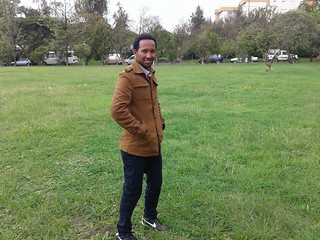RISING voices: Mohammed Ebrahim, Africa RISING site coordinator for Endamehoni, Ethiopia

Mohammed Ebrahim is Africa RISING research site coordinator in Endamehoni Woreda in Ethiopia. This is one of a series of portraits of key people in Africa RISING.
Tell us you previous work experience before joining Africa RISING?
Before Africa RISING, I worked for the Ethiopian Institute of Agricultural Research (EIAR) as Mehoni Agricultural Research Center research extension and socio-economics department coordinator. In this position, I was responsible to link crop, livestock, forest researchers with farmers, identifying training gap and organize training for farmers, development agents (DAs) and experts, field days and field visits, popularize and disseminate agricultural technologies generated by the centers and EIAR, and coordinate assessment and diagnostic studies. As planning and M&E representative, I monitored whether budgets and other properties were used properly for the intended purposes and whether research activities were running smoothly. I also facilitated quarterly review meetings and compiled monthly, quarterly and yearly physical and financial reports of the center.
Can you give us a brief overview of what you do in your current position?
I am mainly responsible for facilitating activities at the site level and supporting partner institution to work closely with the project, follow up research input delivery and the implementation of different on-farm research activities, facilitate kebele and woreda level innovation platform and farmer research groups(FRGs), organize different meetings, workshops, field days, field visits and evaluations at the site level, manage staff and operational budgets, compile reports for different meetings and workshops conducted in our area, and represent ILRI at the woreda level.
What most motivates you to do what you do?
I am motivated due to my background in rural development and agricultural extension. I always had a strong interest to change farmers’ life though agricultural research and many technologies which I believe are available from different research institute but remain on the shelf. While the number of population is increasing from time to time and the land size becomes smaller and smaller, diversifying and increasing production from the given plot size is the only option to change farmers’ life, and this will be true only through sustainable agricultural technology.
What is unique about Africa RISING?
The most unique thing that I found in Africa RISING project is its participatory approach through the Innovation Platforms (IP) and integrated research approach.
What do you think are the most challenging part working in Africa RISING?
Facilitating partners’ engagement and bringing different institutions together for common objectives was the most challenging part of the project work. It needs a special communication skill and effort.
And how do you think you contribute to address these challenges?
I think I am contributing a lot of because there is a true partner’s engagement in different activities of the project and each partner is exerting its best effort for the success of the project objectives.
What are the lessons you have learned so far?
I have learned that for successful technology diffusion and adoption, research approach should be participatory and should follow a bottom up approach. Farmers get interested when any intervention target their priority problem, and they believe when they see and participate.
Any interesting story you have while working in Africa RISING that you would like to share with us?
Africa RISING Endamehoni site didn’t have any research interventions before. Farmers produce local crop varieties which have very low yield and mature late. But Africa RISING introduced early maturing and high yield potential potato varieties (350-500 Q/ha). Many farmers are currently producing improved varieties and increasing their income from selling potato. For continuous seed supply we have established a seed producer cooperative. Crop residue, shade and feed trough technologies are also bringing significant change to protect feed loss during storage and feeding and the woreda Agriculture office is currently scaling the technology to other kebeles in the woreda. In 2013, the Mekelle 4-wheat variety demonstration yield is recorded as the regional highest productivity potential of wheat.




